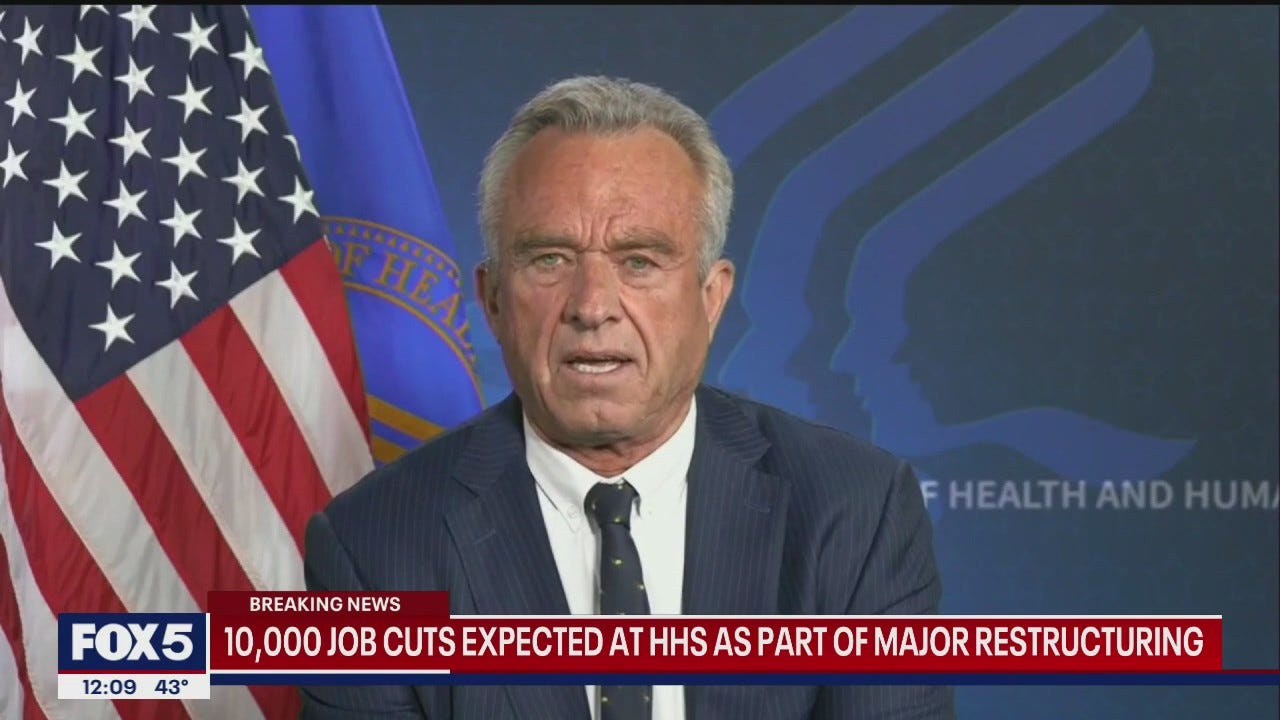
‘We’re going to consolidate:’ JFK on HHS layoffs
10,000 job cuts expected at HHS as part of major restructuring.
Fox – 5 NY
Federal agencies that influence or fund how Americans get health care face widespread changes under plans by Health Secretary Robert F. Kennedy Jr. to eliminate 10,000 jobs from the U.S. Department of Health and Human Services.
When combined with earlier buyouts and voluntary departures, the overhaul will eliminate about 1 in 4 federal health agency jobs and save $1.8 billion each year, HHS said.
These targeted federal agencies oversee how the nation pays for health care for older Americans and the poor. They also research infectious diseases and public health threats. The overhaul also will bring changes to the agency that scrutinizes the safety of prescription drugs, food and medical devices.
Here is how the agencies targeted for cuts impact the health care Americans receive:
What do RFK Jr’s HHS cuts mean for the FDA?
The Food and Drug Administration oversees prescription drug approvals and medical devices in the United States. HHS announced the restructuring will terminate 3,500 full-time FDA employees.
The announcement comes one day after the Senate confirmed Johns Hopkins physician Marty Makary as commissioner of the FDA, so it will be Makary’s job to maintain agency operations with a leaner staff.
HHS said in a news release that the reductions won’t affect drug or medical device approvals. Drug companies, medical device makers and other industry organizations pay “user fees” that help the FDA complete timely reviews of new drugs and devices.
But impacts on the timing of drug and device approvals may be unavoidable, said JP Leider, director for the Center for Public Health Systems at the University of Minnesota.
A federal worker who is technically categorized as clerical or administrative could also be integral to delivering these services, he said. Cutting workers like that could indirectly impact drugs, medical devices and food.
Other workers may also have to double their workloads to compensate for cuts, which could slow down overall productivity.
“Getting everybody into the same system means there will be slowdowns,” Leider said. “That’s just part of these changes.”
How will this affect food?
The job cuts might hamper the FDA’s ability to tackle cutting-edge issues such as the use of artificial intelligence or making the nation’s food supply safer and more nutritious, said Peter Pitts, a former FDA associate commissioner.
“The announcement sounds more like a ready, fire, aim proposition,” said Pitts, co-founder of the Center for Medicine in the Public Interest, a nonprofit research and educational organization.
Kennedy has said he wants to focus on the nation’s food supply to use nutrition as a way to improve human health, but such an ambitious goal “doesn’t require fewer people, it requires more people,” Pitts said.
HHS officials did not immediately say how the changes will allow Kennedy to carry out goals of making the nation’s food supply healthier. Earlier this month, Kennedy launched a database on the FDA’s website that allows people to search for chemicals in foods.
The agency said it will combine five existing HHS divisions that focus on job safety, preventive medicine, substance abuse, toxic substances and overall health. The new entity, which will be named the Administration for a Healthy America, will coordinate chronic care, disease prevention and health resources for low-income Americans. Divisions will focus on primary care, maternal and child health, mental health, environmental health, HIV/AIDS and workforce.
I’m on Medicare or Medicaid. Should I be worried?
The Centers for Medicare & Medicaid Services oversees federal health programs for adults 65 and older, low-income families, people with disabilities and children. The agency will cut about 300 employees, but HHS said the reorganization “will not impact Medicare and Medicaid services.”
However, Congress plans additional cuts that advocates say could eliminate coverage for some low-income Americans.
In February, the House passed a budget resolution that called for $880 billion in savings and spending reductions from programs under the Congressional committee overseeing Medicaid. The Senate has proposed less expensive cuts, but advocates worry about significant changes to Medicaid, the federal-state health insurance program that covers nearly 1 in 5 Americans.
Will this jeopardize CDC, NIH research?
The Centers for Disease Control and Prevention will cut 2,400 positions. In addition, the Administration for Strategic Preparedness and Response, which currently operates in the U.S. Public Health Service, will move to the CDC.
The National Institutes of Health, which funds biomedical research through grants and programs, will eliminate 1,200 jobs. HHS said the cuts will be achieved by streamlining procurement, human resources and communications across its 27 institutes and centers.
Leider worries about how these cuts will affect the next generation of scientists. NIH is “hugely impactful” for research and innovation in both the private and public sector, and without the agency’s funding, young people may not be motivated or able to find entry level jobs that could kick off their scientific career, Leider said.
“There’s this idea that for decades we have been a world leader in science and without the NIH to keep that pipeline going, it will be really hard for young scientists with bright minds to do that work in the U.S.,” Leider said.
发表回复